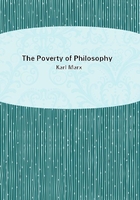
第14章 (6)
It is important to emphasize the point that what determines value is not the time taken to produce a thing, but the minimum time it could possibly be produced in, and the minimum is ascertained by competition. Suppose for a moment that there is no more competition and consequently no longer any means to ascertain the minimum of labor necessary for the production of a commodity; what will happen? It will suffice to spend six hours' on the production of an object, in order to have the right, according to M.
Proudhon, to demand in exchange six times as much as the one who has taken only one hour to produce the same object.
Instead of a "proportional relation", we have a disproportional relation, at any rate if we insist on sticking to relations, good or bad.
The continual depreciation of labor is only one side, one consequence of the evaluation of commodities by labor time. The excessive raising of prices, overproduction and many other features of industrial anarchy have their explanation in this mode of evaluation.
But does labor time used as a measure of value give rise at least to the proportional variety of products that so delights M. Proudhon?
On the contrary, monopoly in all its monotony follows in its wake and invades the world of products, just as to everybody's knowledge monopoly invades the world of the instruments of production. It is only in a few branches of industry, like the cotton industry, that very rapid progress can be made. The natural consequence of this process is that the products of cotton manufacture, for instance, fall rapidly in price: but as the price of cotton goes down, the price of flax will be replaced by cotton.
In this way, flax has been driven out of almost the whole of North America.
And we have obtained, instead of the proportional variety of products, the dominance of cotton.
What is left of this "proportional relation"? Nothing but the pious wish of an honest man who would like commodities to be produced in proportions which would permit of their being sold at an honest price.
In all ages good-natured bourgeois and philanthropic economists have taken pleasure in expressing this innocent wish.
Let us hear what old Boisguillebert says:
"The price of commodities," he says, "must always be proportionate;for it is such mutual understanding alone that can enable them to exist together so as to give themselves to one another at any moment (here is M. Proudhon's continual exchangeability) and reciprocally give birth to one another....
"As wealth, then, is nothing but this continual intercourse between man and man, craft and craft, etc., it is a frightful blindness to go looking for the cause of misery elsewhere than in the cessation of such traffic brought about by a disturbance of proportion in prices."( Dissertation sur la nature des richesses , Daire's ed. [pp.405 and 408])[Boisguillebert's work is quoted from the symposium Economistes-financiers du XVIII siecle . Prefaced by a historical sketch on each author and accompanied by commentaries and explanatory notes by Eugene Daire;Paris 1843.]
Let us listen also to a modern economist:
"The great law as necessary to be affixed to production, that is, the law of proportion, which alone can preserve the continuity of value....
"The equivalent must be guaranteed....
"All nations have attempted, at various periods of their history, by instituting numerous commercial regulations and restrictions, to effect, in some degree, the object here explained....
But the natural and inherent selfishness of man... has urged him to break down all such regulations. Proportionate Production is the realization of the entire truth of the Science of Social Economy."(W. Atkinson, Principles of Political Economy , London 1840, pp.170-95)Fuit Troja . [Troy is no more.] This true proportion between supply and demand, which is beginning once more to be the object of so many wishes, ceased long ago to exist. It has passed into the stage of senility. It was possible only at a time when the means of production were limited, when the movement of exchange took place within very restricted bounds.
With the birth of large-scale industry this true proportion had to come to an end, and production is inevitably compelled to pass in continuous succession through vicissitudes of prosperity, depression, crisis, stagnation, renewed prosperity, and so on.
Those who, like Sismondi, wish to return to the true proportion of production, while preserving the present basis of society, are reactionary, since, to be consistent, they must also wish to bring back all the other conditions of industry of former times.
What kept production in true, or more or less true, proportions?
It was demand that dominated supply, that preceded it. Production followed close on the heels of consumption. Large-scale industry, forced by the very instruments at its disposal to produce on an ever-increasing scale, can no longer wait for demand. Production precedes consumption, supply compels demands.
In existing society, in industry based on individual exchange, anarchy of production, which is the source of so much misery, is at the same time the source of all progress.
Thus, one or the other:
Either you want the true proportions of past centuries with present-day means of production, in which case you are both reactionary and utopian.
Or you want progress without anarchy: in which case, in order to preserve the productive forces, you must abandon individual exchange.
Individual exchange is suited only to the small-scale industry of past centuries with its corollary of "true proportion", or else to large-scale industry with all its train of misery and anarchy.